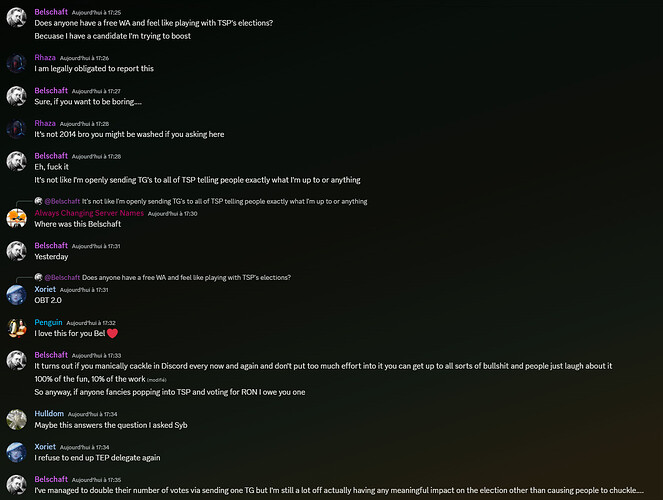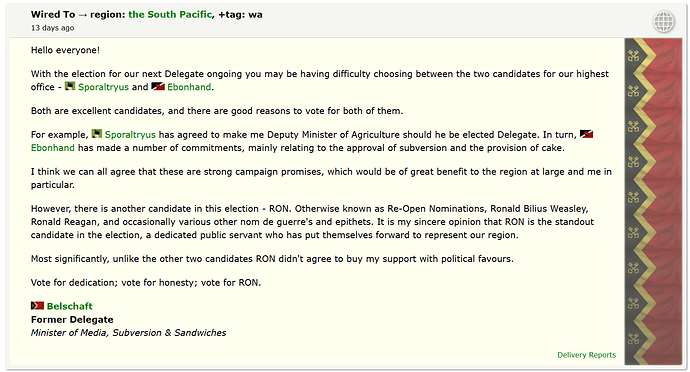[2402.HC] ProfessorHenn v. Belschaft
Charge
Electoral Fraud
Summary of the Opinion
It is the finding of the Court that it is not substantially more likely than not that Belschaft committed the crime of electoral fraud in the context of the January 2025 Delegate Election on account of the fact that even though Belschaft did solicit votes for said election, it has not been established that there was an underlying corrupt purpose in doing so.
Chief Justice Kringle delivered the opinion, signed also by Justice Pronoun.
The Court finds that it is not substantially more likely than not that Belschaft committed the crime of electoral fraud in the context of the January 2025 Delegate Election. This is the result of a consideration of the relevant facts and arguments as presented to or otherwise ascertained by the Court, as well as a careful review of the elements that constitute the aforementioned crime.
Belschaft posted on 27 January 2025 in a server called Max’s Chosen to request that any individuals with an available World Assembly nation vote in the January 2025 Delegate Election for the option to Re-Open Nominations (RON). An abbreviated version of the post and subsequent exchange is reproduced for the record as follows1:
Belschaft — 27/01/2025, 17:25
Does anyone have a free WA and feel like playing with TSP’s elections?
Becuase I have a candidate I’m trying to boost
Rhaza — 27/01/2025, 17:26
I am legally obligated to report this
[…]
Belschaft — 27/01/2025, 17:28
Eh, fuck it
It’s not like I’m openly sending TG’s to all of TSP telling people exactly what I’m up to or anything
[…]
Belschaft — 27/01/2025, 17:33
It turns out if you manically cackle in Discord every now and again and don’t put too much effort into it you can get up to all sorts of bullshit and people just laugh about it
100% of the fun, 10% of the work * So anyway, if anyone fancies popping into TSP and voting for RON I owe you one
[…]
Belschaft — 27/01/2025, 17:35
I’ve managed to double their number of votes via sending one TG but I’m still a lot off actually having any meaningful impact on the election other than causing people to chuckle…
In the above exchange Belschaft states an intent to “play with TSP’s elections”2, noting that they are “openly sending TGs to all of TSP telling people exactly what [they are] up to”3 and that “if you manically cackle in Discord every now and again […] you can get up to all sorts of bullshit and people just laugh about it”4. This took place even as Belschaft was advised by Rhaza, Delegate of the Plains of Perdition, that the interaction would have to be reported.
Belschaft also sent the day before, on 26 January 2025, a mass telegram to the South Pacific where they presented a case for why citizens should vote for RON over either of Griffindor (also known as Ebonhand) or ProfessorHenn (also known as Sporaltryus), referring to RON as “the standout candidate in the election, a dedicated public servant who has put themselves forward to represent our region”5 and noting that “unlike the other two candidates RON didn’t agree to buy my support with political favours”6.
Roavin, defence counsel, asserted in response to this case that Belschaft engaged in satire, even if they did not explicitly label it as such, and further noted that there is no requirement in law that satire should be labelled. Roavin further noted that for Belschaft to have committed electoral fraud there must have been an underlying corrupt purpose, contending that no such purpose has been produced by the plaintiff and that “over the past 22 years, the South Pacific has enjoyed a rich tradition of satire, much of which was not labelled as such”7.
ProfesorHenn, plaintiff, in turn contended that is was not clear from either the exchange in Max’s Chosen or the mass telegram that Belschaft was engaging in satire and that Belschaft’s underlying corrupt purpose would be “personal amusement by way of making a mockery out of our political system”8. Welly, amicus curiae, suggests on a parallel line that “soliciting proscribed foreigners to vote in our Delegate election is a corrupt purpose, whether or not it is also amusing to the perpetrator”9.
Criminal Code 2(9) requires the recruitment and organisation of a group of people to vote in a particular way with an underlying corrupt purpose10. It would be remiss for the Court to claim that Belschaft did not at least seek to recruit individuals who would be willing to vote for Re-Open Nominations in the January 2025 Delegate Election, that much is clear from the exchange in Max’s Chosen.
However, the Court must consider if there was an underlying corrupt purpose behind said recruitment. The Criminal Code offers some guidance on the matter, defining the crime of corruption as “misuse of public office for private or personal advantage”11. Clearly electoral fraud can occur without the offender holding public office, but insofar as the Criminal Code can offer context it is useful to consider that the underlying corrupt purpose in the definition of electoral fraud would refer to some private or personal advantage for the offender that would not otherwise be obtained without the use of legitimate means such as regular campaigning.
It is not clear to the Court that Belschaft had an underlying corrupt purpose in attempting to recruit individuals to vote a certain way in the January 2025 Delegate Election. While Welly makes a case that the very fact of recruiting from abroad constitutes a corrupt purpose, the Court must disagree and note that while actions can be indicative of purpose, one cannot be confused with the other. To the extent that Belschaft repeatedly made fun of their actions, emphasised their desire to have fun, and even referred to RON as a person rather than an electoral design, it is reasonable to see their purpose as satirical rather than corrupt.
In view of the facts as reviewed by the Court in the paragraphs preceding, the Court must find that while Belschaft did attempt to recruit individuals to vote in the January 2025 Delegate Election it is not substantially more likely than not that this was done with an underlying corrupt purpose, and thereby finds Belschaft not guilty of the crime of electoral fraud. In so finding, however, the Court also notes that this verdict stems from a careful review of the specific circumstances and facts of this case and that the mere action of adding satirical commentary to one’s interactions is not in and of itself a sufficient condition to negate the possible existence of an underlying corrupt purpose.
Footnotes and References
-
Belschaft and Rhaza (2025). Conversation between Belschaft and Rhaza on Max’s Chosen (personal communication).
-
Belschaft and Rhaza (2025). Conversation between Belschaft and Rhaza on Max’s Chosen (personal communication).
-
Belschaft and Rhaza (2025). Conversation between Belschaft and Rhaza on Max’s Chosen (personal communication).
-
Belschaft (2025). Telegram from 26 January 2025. Retrieved from https://www.nationstates.net/page=tg/tgid=35839658.
-
Belschaft (2025). Telegram from 26 January 2025. Retrieved from https://www.nationstates.net/page=tg/tgid=35839658.
-
Belschaft (2025). Telegram from 26 January 2025. Retrieved from https://www.nationstates.net/page=tg/tgid=35839658.
-
Roavin (2025). Brief amicus curiae from 16 March 2025. Retrieved from [2502.HC] ProfessorHenn v. Belschaft - #13 by Roavin.
-
ProfessorHenn (2025). Brief amicus curiae from 09 March 2025. Retrieved from [2502.HC] ProfessorHenn v. Belschaft - #9 by ProfessorHenn.
-
Welly (2025). Brief amicus curiae from 22 April 2025. Retrieved from [2502.HC] ProfessorHenn v. Belschaft - #16 by Welly.
-
Criminal Code; Article 2, Section 9 (2024). The MATT-DUCK Law Archive.
-
Criminal Code; Article 2, Section 8 (2024). The MATT-DUCK Law Archive.

